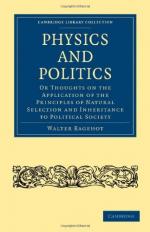The real destiny, the inner destiny would in any event have followed its course in the souls of Claudius and Gertrude; for these sinful ones had delivered themselves into its hands, as must needs be the case with those whose ways are evil; but would it have dared to spread its influence abroad if one of those sages had been in the palace? Would it have dared to overstep the shining, denouncing barrier that his presence would have imposed, and maintained, in front of the palace gates? When the sage’s destiny blends with that of men of inferior wisdom, the sage raises them to his level, but himself will rarely descend. Neither on earth nor in the domain of fatality do rivers flow back to their source. But to return: let us imagine a sovereign, all-powerful soul—that of Jesus, in Hamlet’s place at Elsinore; would the tragedy then have flown on till it reached the four deaths at the end? Is that conceivable? A crime may be never so skilfully planned—when the eyes of deep wisdom rest on it, it becomes like a trivial show that we offer to very small children at nightfall: some magic-lantern performance, whose tawdry imposture a last gleam of sunshine lays bare. Can you conceive Jesus Christ—nay, any wise man you have happened to meet—in the midst of the unnatural gloom that overhung Elsinore? Is not every action of Hamlet induced by a fanatical impulse, which tells him that duty consists in revenge alone? and does it need superhuman effort to recognise that revenge never can be a duty? I say again that Hamlet thinks much, but that he is by no means wise. He cannot conceive where to look for the weak spot in destiny’s armour. Lofty thoughts suffice not always to overcome destiny; for against these destiny can oppose thoughts that are loftier still; but what destiny has ever withstood thoughts that are simple and good, thoughts that are tender and loyal? We can triumph over destiny only by doing the very reverse of the evil she fain would have us commit. For no tragedy can be inevitable. At Elsinore there is not a soul but refuses to see, and hence the catastrophe; but a soul that is quick with life will compel those around it to open their eyes. Where was it written that Laertes, Ophelia, Hamlet, Claudius, Gertrude, should die— where, save in Hamlet’s pitiful blindness? But was this blindness inevitable? Why speak of destiny when a simple thought had sufficed to arrest all the forces of murder? The empire of destiny is surely sufficiently vast. I acknowledge her might when a wall crashes down on my head, when the storm drives a ship on the rocks, when disease attacks those whom I love; but into man’s soul she never will come, uncalled. Hamlet is unhappy because he moves in unnatural darkness; and his ignorance puts the seal upon his unhappiness. We have but to issue commands and fate will obey—there is nothing in the world that will offer such long and patient submission. Horatio, up to the last, could have issued commands; but his master’s




